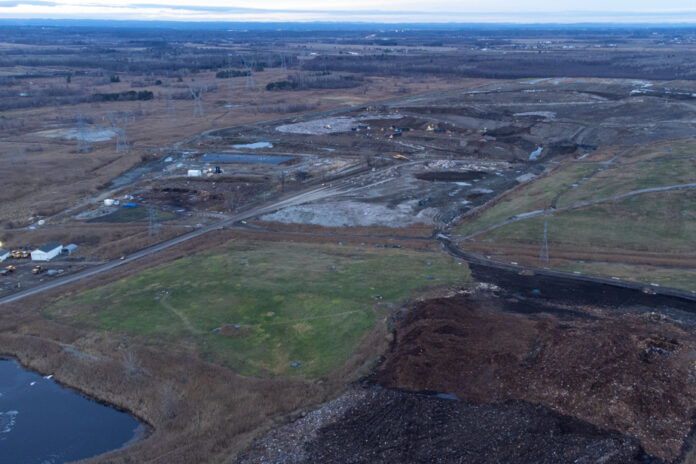The largest landfill in Quebec wants to extend its activities for 30 years and thus receive 44.5 million cubic meters of additional waste, enough to fill the Olympic Stadium in Montreal 24 times.
The expansion project for the Lachenaie engineered landfill (LET), in Terrebonne, was filed with the Environmental Assessment Registry of Quebec on March 7, confirming the intentions already expressed in the past by its owner, the Canadian subsidiary of the American multinational Waste Connections.
This landfill is the only one on the territory of the Montreal Metropolitan Community (CMM), and its authorized capacity should be reached in 2027, now forecasts the company, which previously mentioned the year 20291.
Waste Connections wants to “bury waste materials there for another 30 years, that is, until 2057,” at the current rate of 1.5 million cubic meters per year, it writes in the document filed with the Register. .
The company has in recent years acquired the necessary land for the expansion; she estimates that she needs a “minimum period of 48 months” to achieve this.
Such an expansion would be contrary to what should be done, believes the director general of the Quebec Front for ecological waste management, Karel Ménard.
“I find it pathetic, it’s a project from the 1990s,” when the mega landfills first appeared, he says.
These sites receive such a high volume of waste that they can “beat the competition” and offer prices that make landfilling much more attractive than any other solution, Ménard laments.
It is inconsistent that municipalities must plan waste management, but that their burial is entrusted to private companies who do “everything to have as many bins as possible”, he notes.
The government is “held hostage” by an oligopoly of companies in the sector “who dictate the agenda of elimination in Quebec”, accuses Karel Ménard.
“There are five sites in Quebec that manage more than 75% of the garbage cans, and they belong to three companies,” he points out.
Karel Ménard advocates for smaller landfills, receiving waste from their surrounding environment, in order to “sensitize the generators”.
Waste Connections argues that the Bureau d’audiences publiques sur l’environnement (BAPE) indicated in its report on the management of “ultimate waste”, in January 2022, that new disposal sites or expansions of existing sites will be necessary. over the next 20 years.
“It is obvious that we are going to have to have new authorizations, we will not achieve zero waste tomorrow morning, replies Karel Ménard, but [Waste Connections] fuels the problem of overproduction of waste. »
The BAPE report also pointed out that Quebec should prioritize reduction at source and stop relying on recycling to reduce the amount of waste it generates2.
The expansion of the Lachenaie site would lead to various impacts during the development phase, including the emission of dust and exhaust gases, noise, traffic and the loss of natural environments, indicates the company, specifying that the nearest residences are 750 meters from the site, which is one of the components of the Enviro Connections Complex, which also includes a biomethane production plant, a sorting center and a composting center.
The exploitation would cause odors and biogas emissions, including methane, a powerful greenhouse gas (GHG).
“The progressive implementation of the active biogas capture system [will make it possible] to significantly limit these impacts on the environment”, affirms Waste Connections, which makes Karel Ménard jump.
“If there’s biogas coming out of the cells, it’s a failure, it means we’ve buried organic material that shouldn’t be there,” he said.
A major methane release had also been detected by satellite3, in November, at the Lachenaie site, which Waste Connections had attributed to a maintenance operation.
The new landfill cells will be equipped with a leachate collection system, which will pass through the pre-treatment plant that is already on site before being pumped to the Mascouche-Terrebonne municipal treatment plant.
The project could be subject to a review by the BAPE, the office of the Minister of the Environment, the Fight Against Climate Change, Wildlife and Parks, Benoit Charette, told La Presse.
“The requests for expansion of landfills show us that it is essential to reduce the use of landfills as much as possible”, which the Legault government has tackled with the modernization of deposit and collection selection and the strategy to promote the composting of organic matter, further declared the Minister’s press attaché, Mélina Jalbert.


















